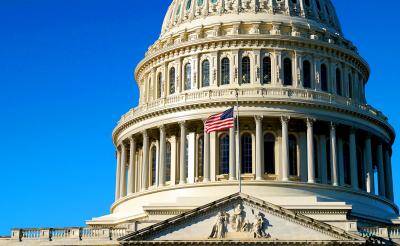The US Congress on Tuesday unveiled the National Defense Authorization Act (NDAA) for Fiscal Year 2023, which authorizes up to US$12 billion in grants and loans to Taiwan over the next five years to buy US weapons.
The act authorizes up to US$2 billion in annual grants from next year to 2027, as well as an additional US$2 billion in loans for Taiwan to bolster its military capabilities with weapons from the US.
It also authorizes a regional contingency stockpile for Taiwan of up to US$100 million in munitions a year for use in the event of a conflict.

Photo: Reuters
The act also recommends that Washington invite Taiwan to attend the next Rim of the Pacific Exercise in 2024, which the US organizes.
This version of the act, which is passed annually to set policy for the Pentagon, was a result of months of negotiations between Democrats and Republicans in the US Senate and House of Representatives.
It was based on two bills: the House version of the NDAA for Fiscal Year 2023, which passed the House on July 14, and the Senate version of the NDAA for Fiscal Year 2023, which was approved by the Senate Committee on Armed Services on June 16.
This version of the act authorizes a budget of US$817 billion for the US Department of Defense and US$29 billion for national security programs within the US Department of Energy, the Senate and House Committee on Armed Services said in a news release.
It also authorizes critical investments in military technology, provides a 4.6 percent pay raise for US service members, and ensures that they have the support, equipment and training they need, the news release said.
Reuters reported that he act is expected to pass the Senate and House this month, before being sent to the White House for US President Joe Biden to sign into law.

Taiwanese can file complaints with the Tourism Administration to report travel agencies if their activities caused termination of a person’s citizenship, Mainland Affairs Council Minister Chiu Chui-cheng (邱垂正) said yesterday, after a podcaster highlighted a case in which a person’s citizenship was canceled for receiving a single-use Chinese passport to enter Russia. The council is aware of incidents in which people who signed up through Chinese travel agencies for tours of Russia were told they could obtain Russian visas and fast-track border clearance, Chiu told reporters on the sidelines of an event in Taipei. However, the travel agencies actually applied

Japanese footwear brand Onitsuka Tiger today issued a public apology and said it has suspended an employee amid allegations that the staff member discriminated against a Vietnamese customer at its Taipei 101 store. Posting on the social media platform Threads yesterday, a user said that an employee at the store said that “those shoes are very expensive” when her friend, who is a migrant worker from Vietnam, asked for assistance. The employee then ignored her until she asked again, to which she replied: "We don't have a size 37." The post had amassed nearly 26,000 likes and 916 comments as of this

New measures aimed at making Taiwan more attractive to foreign professionals came into effect this month, the National Development Council said yesterday. Among the changes, international students at Taiwanese universities would be able to work in Taiwan without a work permit in the two years after they graduate, explainer materials provided by the council said. In addition, foreign nationals who graduated from one of the world’s top 200 universities within the past five years can also apply for a two-year open work permit. Previously, those graduates would have needed to apply for a work permit using point-based criteria or have a Taiwanese company

The Shilin District Prosecutors’ Office yesterday indicted two Taiwanese and issued a wanted notice for Pete Liu (劉作虎), founder of Shenzhen-based smartphone manufacturer OnePlus Technology Co (萬普拉斯科技), for allegedly contravening the Act Governing Relations Between the People of the Taiwan Area and the Mainland Area (臺灣地區與大陸地區人民關係條例) by poaching 70 engineers in Taiwan. Liu allegedly traveled to Taiwan at the end of 2014 and met with a Taiwanese man surnamed Lin (林) to discuss establishing a mobile software research and development (R&D) team in Taiwan, prosecutors said. Without approval from the government, Lin, following Liu’s instructions, recruited more than 70 software